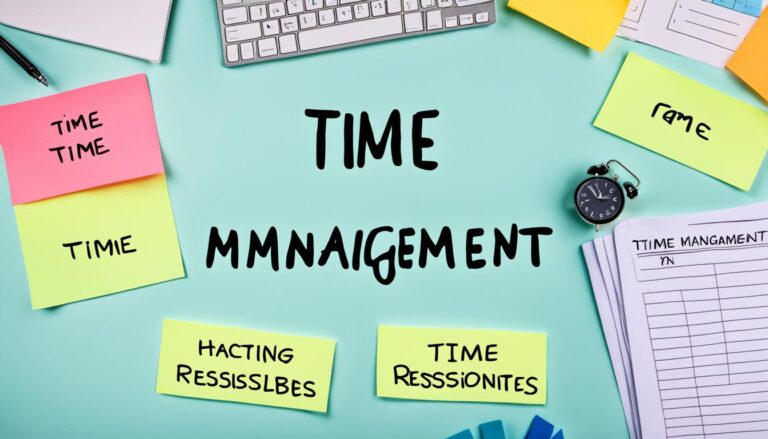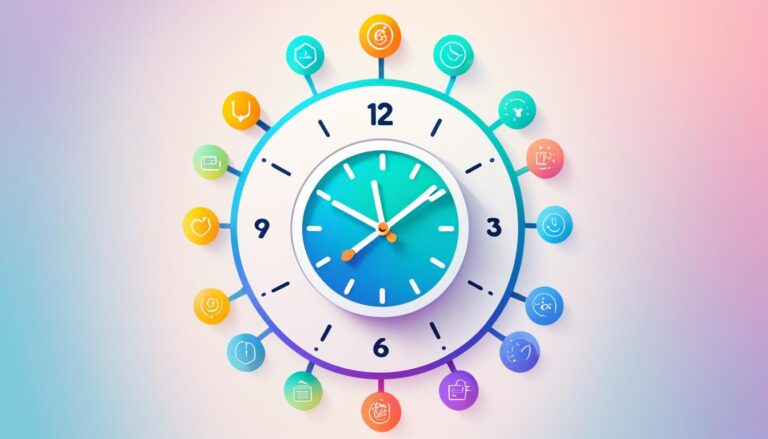Unlock Your Potential: Time Management Skills Meaning

Do you often find yourself struggling with an overwhelming to-do list and the feeling that there simply aren’t enough hours in the day? Have you ever wondered how some people seem to effortlessly accomplish their goals while others struggle to even get started?
Time management skills have long been revered as a key factor in achieving success and realizing one’s full potential, but what do these skills really mean? Is it just about effectively managing your time, or is there more to it?
In this article, we will delve into the true meaning of time management skills and explore how they can unlock your potential, improve productivity, and reduce stress. Get ready to discover the secrets to mastering time and taking control of your life.
Key Takeaways:
- Time management skills go beyond simply managing your time efficiently.
- They empower individuals to prioritize tasks, eliminate distractions, and make better use of technology.
- Working with a time management coach can lead to lasting changes and greater success.
- Mastering time management skills allows for increased productivity, reduced stress, and better work-life balance.
- By setting goals and employing effective strategies, you can maximize your time and achieve your goals.
The Essence of Time Management Skills
Time management is a crucial aspect of success and productivity. It involves organizing and planning your time effectively to accomplish tasks and achieve your goals. By honing your time management skills, you can optimize your efficiency, reduce stress, and take control of your life.
Effective time management strategies enable individuals to accomplish more in less time. By prioritizing tasks and allocating time wisely, you can make significant progress towards your objectives. Time management is not just about being busy; it’s about being productive and purposeful in your actions.
Setting goals is a key component of effective time management. By defining clear objectives, you can align your efforts and focus on what truly matters. Whether it’s short-term targets or long-term aspirations, setting goals helps you stay motivated and channel your energy towards meaningful outcomes.
Prioritizing tasks is another essential skill in time management. It involves evaluating the importance and urgency of different activities and allocating your time accordingly. By identifying and focusing on high-priority tasks, you can make progress towards your goals more efficiently.
Optimizing time utilization is at the core of effective time management. This means finding strategies that work for you to make the most of every minute. Whether it’s creating a schedule, employing productivity techniques, or leveraging technology, finding what suits your unique needs and preferences is crucial.

Effective time management offers numerous benefits beyond productivity. It enhances your overall well-being and quality of life by reducing stress levels and creating a sense of control. With proper time management, you can find a healthy balance between work, personal life, and self-care.
By mastering time management skills, you can unlock your full potential and achieve greater success. So, start prioritizing your time, setting clear goals, and employing effective strategies to optimize your productivity. With the right time management mindset and techniques, you can transform your life and accomplish more than you ever thought possible.
Identifying Time Wasters
Mastering time management brings numerous benefits, such as increased productivity and reduced stress. To improve your time management skills, the first step is to identify and eliminate time-wasting activities that hinder your progress and consume valuable time. Some common time wasters include:
- Frequent checking of social media: Endlessly scrolling through social media platforms can devour hours of your day, distracting you from important tasks and goals.
- Excessive web browsing: Mindlessly browsing the internet can lead to wasting precious time on unproductive websites, articles, or videos.
- Long, unimportant phone calls: Engaging in lengthy conversations that do not contribute to your work or personal growth can eat up significant chunks of your day.
By tracking and minimizing these time wasters, you can free up a considerable amount of time to focus on activities that truly matter. Embracing time management tools and techniques can also enhance your productivity and optimize your time utilization. These tools and techniques provide structure, aid in prioritization, and enable efficient task management.
| Time Management Tools | Description |
|---|---|
| Eisenhower Matrix | Organizes tasks based on their urgency and importance, helping you prioritize effectively. |
| Pomodoro Technique | Divides your work into focused intervals (typically 25 minutes) followed by short breaks to maintain productivity and combat fatigue. |
| Calendar Apps | Allows you to schedule and track your appointments, meetings, and deadlines to stay organized and manage your time efficiently. |
| Task Management Apps | Enables you to create to-do lists, set reminders, and track progress to ensure you stay on top of your tasks. |
By incorporating these time management tools and techniques into your daily routines, you can effectively optimize your time utilization, improve productivity, and ultimately achieve your goals.

Setting Goals for Effective Time Management
Setting goals is a fundamental step in mastering the art of time management. By clarifying your short and long-term goals, you can gain a sense of direction and purpose. Goals provide a roadmap for your actions and help you prioritize tasks effectively. When you know what you want to achieve, it becomes easier to make decisions about how to allocate your time.
One popular framework for setting goals is the SMART goals method: Specific, Measurable, Achievable, Relevant, and Time-bound. When setting SMART goals, you break your objectives down into actionable steps, making them more manageable and attainable.
Why Setting SMART Goals Matters
Specific: Clearly define what you want to achieve. The more specific your goal is, the easier it becomes to determine the tasks needed to accomplish it.
Measurable: Establish criteria to measure your progress and success. Measurable goals allow you to track your achievements and make adjustments along the way.
Achievable: Set goals that are within your reach. While it’s important to strive for challenging objectives, make sure they are achievable given your available resources and capabilities.
Relevant: Ensure that your goals align with your priorities and values. Consider whether the goal is meaningful and relevant to your personal or professional growth.
Time-bound: Set a specific timeframe for achieving your goals. A deadline creates a sense of urgency and helps you stay focused and motivated.
Prioritizing tasks is another crucial aspect of effective time management. Once you have set your goals, evaluate each task based on its importance and urgency. Some tasks may be critical for achieving your goals, while others may be less important or time-sensitive. By prioritizing tasks effectively, you can make better use of your time and ensure that your efforts align with your overarching objectives.
Remember, effective time management is all about making conscious choices. When you prioritize tasks based on their significance and time sensitivity, you optimize your productivity and increase your chances of accomplishing your goals.
| Benefits of Setting Goals for Effective Time Management |
|---|
| 1. Provides direction and focus |
| 2. Increases motivation and sense of accomplishment |
| 3. Improves decision-making and task prioritization |
| 4. Enhances productivity and time utilization |
| 5. Helps avoid procrastination and distractions |

As you embark on your journey towards effective time management, setting goals and prioritizing tasks will become invaluable skills. So take the time to reflect on what you want to achieve and start crafting your SMART goals today!
Time Management at Work
When it comes to success in the workplace, effective time management is key. Developing strong time management skills can make you stand out as a reliable and competent professional. By implementing these time management tips for success, you can optimize your productivity and achieve your career goals.
- Plan each day: Start your day by creating a to-do list or schedule. This will help you prioritize tasks and stay focused throughout the day.
- Prioritize tasks: Identify the most important and urgent tasks and tackle them first. This way, you’ll ensure that you’re focusing your time and energy on the tasks that matter most.
- Set boundaries: Learn to say no to non-essential tasks or requests that can derail your focus. Setting boundaries will help you maintain control over your time and avoid overload.
- Delegate tasks: If possible, delegate tasks to others. By involving your team and sharing responsibilities, you’ll free up valuable time to work on high-priority assignments.
- Take breaks: Don’t underestimate the power of taking short breaks throughout the day. Stepping away from your work for a few minutes can recharge your mind and improve overall productivity.
- Employ productivity tools: Explore various productivity tools and techniques that can enhance your time management skills. From project management software to time-tracking apps, find tools that align with your work style and help you stay organized.
To further illustrate the importance of time management at work, consider the following scenario:
| Employee | No Time Management Skills | Good Time Management Skills |
|---|---|---|
| John | Constantly misses deadlines, feels overwhelmed, and often has to work overtime. | Completes tasks efficiently, meets deadlines, and maintains a healthy work-life balance. |
| Sarah | Struggles to stay focused, easily gets distracted, and lacks a clear plan of action. | Remains focused on priorities, eliminates distractions, and accomplishes tasks effectively. |
As you can see, implementing time management strategies can significantly impact your performance at work. By incorporating these tips into your daily routine, you can better manage your time, reduce stress, and achieve success in your professional endeavors.

The Mental Game of Time Management
When it comes to mastering time management, it’s not just about using external tools and techniques. It’s about transforming your mindset and adopting new ways of thinking about time. By developing the right mental game, you can effectively manage your time and achieve your goals more efficiently.
Here are some time management skills examples that can help you shift your perspective and take control of your time:
- Finding Purpose: Understand your values and what truly matters to you. By aligning your tasks and activities with your purpose, you can prioritize effectively and focus on what truly adds value to your life.
- Changing Limiting Beliefs: Identify and overcome any negative beliefs or self-doubt that may be holding you back. Replace them with positive affirmations and empower yourself to believe in your ability to manage your time effectively.
- Maintaining Focus: Cultivate the ability to concentrate on one task at a time. Minimize distractions, set clear boundaries, and practice deep work techniques to stay focused and avoid multitasking.
- Chunking Tasks: Break down larger tasks into smaller, manageable chunks. This approach not only makes tasks less overwhelming but also helps you make progress and maintain momentum.
- Prioritizing Activities: Learn to prioritize tasks based on their importance and urgency. Focus on high-priority activities that align with your goals and have a significant impact on your success.
- Goal Setting: Set specific, measurable, achievable, relevant, and time-bound (SMART) goals to guide your time management efforts. Having clear goals helps you stay motivated and enables you to allocate your time effectively.
- Being Assertive: Stand up for your time by setting boundaries and learning to say no to non-essential tasks or commitments. Prioritize your own needs and obligations to ensure that your time is used wisely.
- Taking Necessary Breaks: Recognize the importance of rest and rejuvenation. Taking regular breaks helps maintain your energy levels, prevents burnout, and enhances overall productivity.
- Holding Oneself Accountable: Take responsibility for your time management efforts. Regularly assess your progress, reflect on your actions, and make adjustments as needed to stay on track and achieve your goals.
By embracing these time management skills examples, you can transform the way you approach your time and unlock your full potential. Remember, effective time management is not just about managing tasks, but also about managing yourself and making intentional choices that align with your priorities and goals.
Conclusion
Mastering time management skills is crucial for achieving success, reducing stress, and maintaining a healthy work-life balance. By learning and implementing essential time management strategies, you can unlock your full potential and make the most of your time.
One of the key benefits of effective time management is the ability to accomplish more in less time. Prioritizing tasks, setting clear goals, and employing time-saving techniques allow you to optimize your productivity and achieve your objectives efficiently.
Improved time management skills also empower you to experience greater fulfillment and satisfaction. By eliminating distractions, staying focused, and managing your energy levels effectively, you can enhance your overall well-being and find a better balance between work and personal life.
To improve your time management skills, start by analyzing how you currently spend your time and identifying any time-wasting activities. Set specific goals, prioritize tasks based on importance and urgency, and utilize time management tools and techniques to maximize your productivity.
FAQ
What is time management?
Time management refers to organizing and planning your time between activities in order to increase efficiency, productivity, and achieve life goals.
Why are time management skills important?
Effective time management skills allow individuals to accomplish more in less time, reduce stress, and gain control over their lives. It helps prioritize tasks, improve focus, and eliminate distractions.
How can I identify time-wasting activities?
Tracking and minimizing time-wasting activities such as excessive web browsing, social media checking, and long, unimportant phone calls can help free up significant time.
How do I set goals for effective time management?
Clarifying short and long-term goals is crucial. Setting SMART (specific, measurable, achievable, relevant, and time-bound) goals allows individuals to prioritize tasks and focus their efforts on activities that align with their goals.
What are some time management tips for success at work?
Best practices include planning each day, prioritizing tasks, setting boundaries, learning to say no to non-essential tasks, and delegating when possible. Taking breaks and employing productivity tools can also enhance time management in a work setting.
What are some examples of time management skills?
Time management skills go beyond external tools and techniques. They include finding purpose, changing limiting beliefs, maintaining focus, prioritizing activities, goal setting, being assertive, taking necessary breaks, and holding oneself accountable.
What are the benefits of mastering time management skills?
By mastering time management skills, individuals can make the most of their time, accomplish their goals, and experience greater productivity and fulfillment. Time management skills empower individuals to take control of their time and unlock their full potential.






